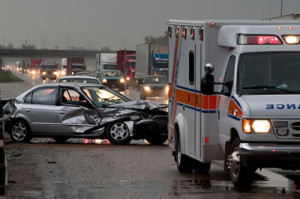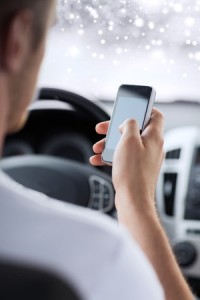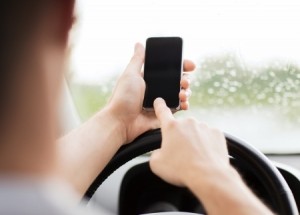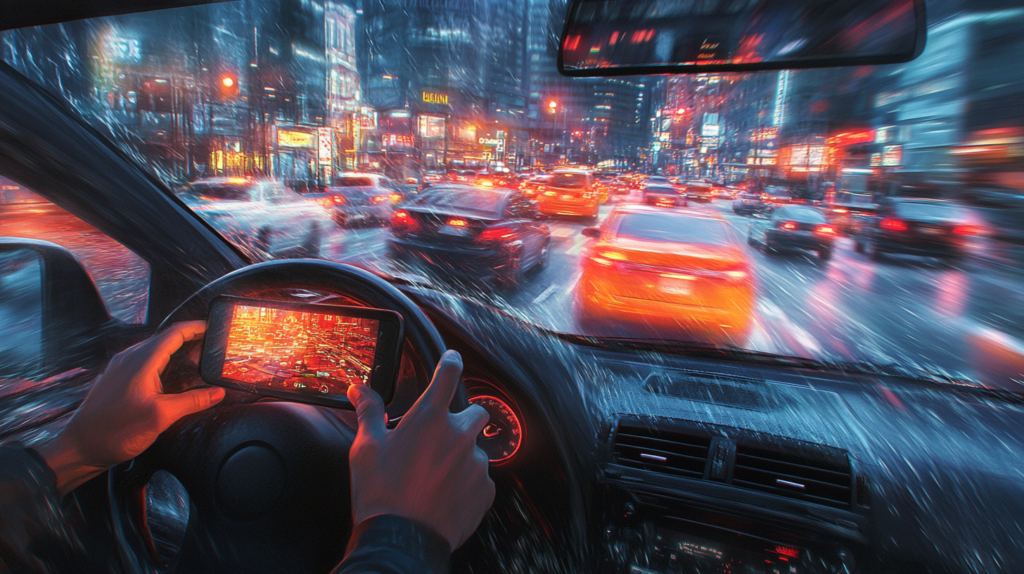What is Distracted Driving?
Distracted Driving is when a person operates a motor vehicle while engaging in activities that divert attention from driving tasks, such as:
- Talking on a cell phone
- Using a navigation system
- Texting or emailing
- Eating
- Adjusting hair or makeup
- Using the audio system
- Texting
According to the National Highway Traffic Safety Administration (NHTSA), “Distracted driving is any activity that…takes your attention away from the task of safe driving.” Studies have shown that texting while driving significantly increases the likelihood of a crash or near-crash event. The detrimental effects of distracted driving can range from minor fender-benders to severe accidents resulting in life-altering injuries or fatalities.
Understanding the risks associated with distracted driving and adopting safe driving practices can help mitigate its adverse impacts on road safety and overall public safety.
More information about Distracted Driving
Don’t Call it a Car “Accident”
 Safety advocates are trying to change the way we talk about motor vehicle crashes.
Safety advocates are trying to change the way we talk about motor vehicle crashes.
Mark Rosekind, head of the National Highway Transportation Safety Administration said that the term car “accident” implies that it was no one’s fault, it could not have been prevented or foreseen.
In reality, more than 90% of collisions are caused by driver error – drinking, distracted driving, speeding, and other risky behavior. Relatively few are true “accidents,” caused by uncontrollable situations like a mechanical malfunction, icy roads, or other factors.
So what difference does it make? Why does it matter what word we use to describe these incidents? Road fatalities are on the rise. Safety officials, lawmakers, and aggrieved families feel strongly that language reflects our attitudes, which affect policy. When the language we use implies that nothing could have been done to prevent a tragic “accident,” […]
Read MoreMore information about Distracted Driving
“Textalyzer” Could Help Reduce Distracted Driving
 Distracted driving, perhaps the biggest road safety scourge of the decade, is getting worse nationwide.
Distracted driving, perhaps the biggest road safety scourge of the decade, is getting worse nationwide.
In Pennsylvania, for instance, distracted driving citations increased by 43% from 2014 to 2015; in our home of Lackawanna County, the number of distracted driving citations skyrocketed from 32 to 115, according to the Scranton Times-Tribune.
Last week, our own Dan Munley was quoted about a recent case in which a Lawrence County judge ruled that a person texting a distracted driver who then got into a crash could potentially be held accountable.
In order to combat this growing problem, some safety advocates have suggested that we begin viewing distracted driving the same way we view drunk driving. While distracted driving does not involve the consumption of an intoxicating substance, distraction can impair your driving ability just as much as alcohol, and it is just as dangerous. […]
Read MoreMore information about Distracted Driving
Distracted Driving with Pets
 There are lots of pet owners among us here at Munley Law Personal Injury Attorneys, so we know that dogs can be the best of companions. But, driving with pets in tow can lead to distracted driving accidents.
There are lots of pet owners among us here at Munley Law Personal Injury Attorneys, so we know that dogs can be the best of companions. But, driving with pets in tow can lead to distracted driving accidents.
Over half of all pet owners report bringing their pet for a car ride at least once a month, and one-third of pet owners do so at least once a week. When bringing your furry friend along for the ride, it’s important to keep safety in mind in order to protect you, your passengers, other motorists, and your pet, too.
According to AAA, some common distracted driving behaviors that pet owners are guilty of include: petting their dog, using hands or arms to restrict dog’s movement or hold dog in place when putting on brakes, using hands/arms to keep dog from climbing from the backseat to the front seat, […]
Read MoreMore information about Distracted Driving
The hashtag #whiledriving shows a disturbing trend
 One of the more idiotic and dangerous trends to develop recently is the hashtag #whiledriving.
One of the more idiotic and dangerous trends to develop recently is the hashtag #whiledriving.
Erie Insurance, a Pennsylvania insurance company, published a study of social media data showing a surge in the use of the hashtag, reflecting a growing number of drivers who pull out their phones, take a picture, and post it to Twitter and Instagram – all while driving. Most of the posts were photos of nature, clouds, a sunset, traffic, and selfies.
The top U.S. states with the most posts using #whiledriving were:
- California
- Florida
- Texas
- South Carolina
- New York
- Illinois
- Massachusetts
- Oregon
- Colorado
- Nevada
No selfie or picture of the sunset is worth putting your life or someone else’s life in danger. […]
Read MoreMore information about Distracted Driving
Attention Labor Day travelers: 3 reasons fatal car accidents are up
Distracted driving proves to be largest cause of fatal car accident increases
 As Labor Day approaches, holiday travelers are warned that fatal car accidents are on the rise this year, according to the National Safety Council. Traffic fatalities are up by 14% and injuries are up by 33%.
As Labor Day approaches, holiday travelers are warned that fatal car accidents are on the rise this year, according to the National Safety Council. Traffic fatalities are up by 14% and injuries are up by 33%.
About 19,000 people have been killed so far this year, and that’s not including July and August, historically two of the deadliest months of the year for drivers. At this rate, deadly car accidents threaten to reach over 40,000, the highest since 2007. Why is this happening?
It seems surprising. Cars today are equipped with ever-evolving safety technology designed to make them more crash-worthy. The Insurance Institute for Highway Safety continues to improve their safety rating system, developing more tests that cars must pass and higher standards they must meet in order to earn a “good” […]
Read More









